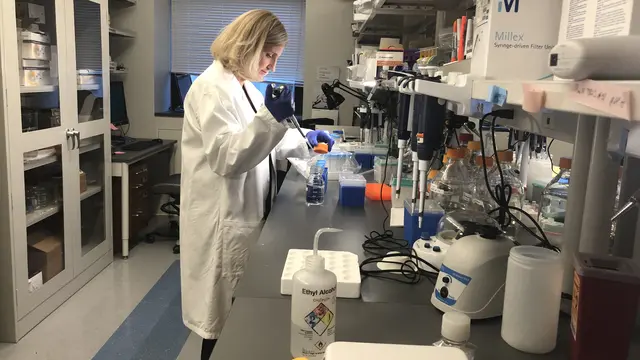
Karla Satchell examines the structure of COVID-19 in Chicago, the U.S. Daniel Williams/CGTN
Scientists around the world are racing to find a vaccine for COVID-19. That includes the Center for Structural Genomics of Infectious Diseases – a consortium of nine labs in eight schools in the United States and Canada.
Karla Satchell, head of the team, is a professor in microbiology-immunology at Northwestern University Feinberg School of Medicine. Her focus is to find a way to stop COVID-19, the novel coronavirus-caused disease that has now killed more than 2,400 people.
What has astonished her though is the global sharing of information by other scientists working on the virus.
"While there is a lot of competition going on as everyone wants to get there first, it's the first to share information as fast as possible which has never before been seen. I for one think that this is a great win for the sharing community and should be held up as an example of what scientists should be doing on an everyday basis."
Scientists are currently studying the structure of the virus and mapping out proteins with the aim of finding a weak spotwhere medicine could then intervene.

CGTN was allowed special access to film at the lab at Northwestern University in Chicago, the U.S. Daniel Williams/CGTN
Chicago was one of the first U.S. cities to report a case of COVID-19 back in January. The city was also the location for the first confirmed person-to-person transmission in the U.S. But both have recovered. There have been no other cases, and concerns about the virus, in Chicago at least, have gone down.
But the global risk remains high as proven by new cases outside of China in Asia, Europe and the Middle East. And that puts further emphasis on the importance of the work of scientists.
"There is a concern I think, the WHO is looking that it may be with us for a long time. And that I think gives more emphasis to what we are doing. Which is, this is likely to persist in the timeline that it will take to develop a vaccine and discover a new drug," says Satchell.
A further negative is the misinformation that has been spread about the virus – even erroneous and non-scientific reports that claimed COVID-19 was bio-engineered.
"There were ideas that this might have been bio-engineered, and that was used for discrimination purposes, and this is something that people are using to drive racism and discrimination. The scientists have disproved these [ideas] over and over again. You are still hearing it on the news even though scientists have disproved them completely. And I think it is very important to know that it did emerge naturally," says Satchell.
For scientists, there is still a great deal of work ahead in the race to stop COVID-19. A shared purpose is helping all of them speed up the journey.
 简体中文
简体中文





